Meta to Remove Facebook Requirement for Quest 2 Starting Next Month
Starting today, Meta is finally pulling back from one of its most controversial moves affecting its VR users, which required all new Quest owners to sign up with a valid Facebook account in addition to forcing legacy Oculus account users to link to Facebook by 2023. Goodbye Facebook, hello Meta.
Update (August 23rd, 2022): Meta has begun the planned rollout of its Meta Account logins and Meta Horizon user profiles, which does away with both Oculus and Facebook logins for Quest and Rift users while establishing a separate profile used with the company’s social platforms.
One of the biggest changes (see the full list below) is the ability to create a Meta account with a simple email address, although users can choose to signup using their Facebook or Instagram login info.
The company says in a blogpost that the update will roll out globally on a gradual basis, although it should arrive to all users soon.
Check out the quick start guide below for additional info on how to migrate from Facebook or Oculus accounts to the new Meta account. The original article announcing the change follows below.
Original Article (July 7th, 2022): The move away from Facebook logins, which was first announced late last year, is said to come into effect sometime in August. It will introduce a new Meta account structure that the company says gives people “more flexibility and control in VR,” as it removes the Facebook account requirement and allows users to unmerge from the social platform entirely if they so choose.
This includes a number of changes. Here’s a quick breakdown of the major features as revealed by Meta:
- Everyone needs a Meta account to login to their device
- Everyone needs a Meta Horizon social profile, used for social stuff
- You can unlink your Facebook account entirely
- New Meta accounts let you add Facebook and/or Instagram to the same Accounts Center for “connected experiences”
- “Friends” will become “Followers” à la Instagram
Facebook, Begone!
Meta is stressing that the new monolithic Meta account login is “not a social profile,” but rather a way to login to let you view and manage your purchased apps. All of those social functions though will be fulfilled by an obligatory Meta Horizon profile, which Meta says can be used in VR and “other surfaces where you use your Meta Horizon profile, like the web.”
All of those social functions though will be fulfilled by an obligatory Meta Horizon profile, which Meta says can be used in VR and “other surfaces where you use your Meta Horizon profile, like the web.”
While linking Facebook and Instagram profiles is possible, neither are a requirement. If you do, Meta says you can play “connected experiences” like finding your Instagram followers to play games with in VR, or chatting with Facebook friends on Messenger.
Just like Facebook profiles, Horizon profiles can be set to certain levels of exposure to other users on the platform. Users will be able to set their social profile to ‘Open to Everyone’, ‘Friends and Family’, and ‘Solo’. You can also set it to private (default for teens aged 13-17), which requires you to approve follower requests. In private mode, only your followers can see who you follow and who follows you. Everyone else will still be able to see your profile picture, avatar, username, display name, follower count, and the number of people you follow.
Horizon Worlds | Image courtesy Meta
For the account, Meta needs your name, email address, phone number, payment information, and date of birth—all of which is non public. The company is also allowing for users to create multiple Meta accounts if they want. Kids under 13 are still not officially allowed on the platform.
All new users will be required to create a Meta account and Horizon profile, but also legacy users who previously merged Oculus accounts with Facebook. Even Oculus account holders who haven’t merged will need both the Meta account and Horizon profile before the previous January 1st, 2023 cut-off date, lest you risk turning your headset into a battery-powered paperweight.
All of it’s obligatory—as in you’ll need to create a Meta account to play your games when Meta pulls the trigger next month—however at least it’s no longer tied to Facebook, which allowed the company to suspend the ability for users to play their own VR games based on behavior outside of VR. It also seems the company is conceptually separating the Meta account login and Meta Horizon profile for now to make the pill go down easier that it’s not just replacing the Facebook login in name only.
It also seems the company is conceptually separating the Meta account login and Meta Horizon profile for now to make the pill go down easier that it’s not just replacing the Facebook login in name only.
Still, if you want to engage in VR activities on a Meta device, it’s pretty clear from hereon out that you’ll have to do so as a willing participant of what could be its own separate but interoperable social network.
Meta Will No Longer Require Facebook Account to Log In to Quest VR Headset
This story is part of Making the Metaverse, CNET’s exploration of the next stage in the internet’s evolution.
What’s happening
Come August, people who use Meta’s VR devices will no longer need their Facebook accounts to log in. The company is also updating its policies and rolling out more privacy controls in VR.
Why it matters
The changes reflect how the social network is doubling down on its metaverse ambitions. Requiring a Facebook login to use its VR devices was also a move that upset users.
Facebook parent company Meta said Thursday that it’ll no longer require people to sign in to their Facebook accounts to use its virtual reality headsets.
The social media giant started requiring a Facebook login for its VR platform in 2020, upsetting people who were concerned about data privacy or just didn’t want to use the social network. At the time, the company said the move would make it easier for people to find and socialize with friends in VR.
In August, Meta will prompt VR users to set up a Meta account and Horizon profile.
Meta
In August, people will be able to create Meta accounts to log in to their Quest VR headsets and choose if they want to use their Facebook and Instagram accounts in VR. Once they create a Meta account, they’ll be prompted to create a social profile in VR known as the Meta Horizon profile.
«This will give everyone more choice about how you show up in the metaverse,» said Meta CEO Mark Zuckerberg in a statement.
The new account structure is just one of the changes Meta is making in August to reflect its focus on the metaverse, virtual spaces where, in the company’s vision, people work, play and socialize. Facebook changed its corporate name to Meta last year. The rebranding also affected Oculus, the VR headset maker Facebook purchased in 2014 for more than $2 billion. Meta renamed the Oculus Quest 2 headset the Meta Quest 2 headset.
Meta has different deadlines for when VR users will need to create a Meta account, and they depend on how people currently sign in to their VR devices. If you’re a new VR device user or previously merged your Oculus account with your Facebook account, you’ll be prompted in August to create a Meta account and Meta Horizon profile. People who previously merged their Oculus accounts with their Facebook accounts will be able to unlink them as well.
Even though in 2020 the social network started requiring a Facebook login to use its VR devices, the company also gave existing users the option to use their Oculus account until Jan. 1, 2023. After that deadline, those users will need to create a Meta account and Meta Horizon profile to continue to use the device.
1, 2023. After that deadline, those users will need to create a Meta account and Meta Horizon profile to continue to use the device.
Meta will ask for your name, email address, phone number, payment information and date of birth for age verification when you create this new type of account. Meta says this information will be private and that users will be able to create multiple Meta accounts.
People in most countries must be at least 13 years old to create a Meta account. In Spain and South Korea, the age requirement to create a Meta account is at least 14 years old.
Meta said in August that «friends» in VR will now become «followers,» a structure that Meta-owned Instagram uses.
As part of these updates, Meta is also rolling out more privacy controls in VR. Users will be able to set their privacy settings to Open to Everyone, Friends and Family, and Solo. They’ll also be able to set their Meta Horizon profiles to private so they can review and approve who they want as followers. Meta Horizon profiles for teenagers between the ages of 13 and 17 will be set to private by default.
Meta Horizon profiles for teenagers between the ages of 13 and 17 will be set to private by default.
Meta is also changing some of its policies because of the rollout of Meta accounts. For example, the updated privacy policy outlines what information Meta collects when you create a Meta Horizon profile, such as your profile picture, avatar and interaction with games and apps. The updated policies go into effect in August.
Oculus introduces mandatory authorization via Facebook from October 2020 / Sudo Null IT News
denis-19
Reading time
2 min
Views
4.4K
Development for AR and VR *Gadgets Social networks and communities IT companies
On August 18, 2020 Oculus announced changes in procedure of authorization of users for full access to all functions of devices of virtual reality of the company.
Oculus introduces mandatory authorization of all owners of VR helmets through Facebook from the beginning of October 2020. New users of Oculus devices will need to sign in with a Facebook account right away. If a user already has an Oculus account and wants to register a new device, they will have to do so through their Facebook account. Existing Oculus and Facebook user accounts will need to be manually merged by users.
If the user of the Oculus VR headset refuses to use authorization through Facebook, then after two years he will have limited access to some functions of the virtual reality device, as they may require access to the social network. Headsets will no longer receive updates after January 1, 2023, and some games and apps will no longer run on them, as Oculus accounts will be completely disabled.
Reasons for Oculus innovation — transferring users to the Facebook system. From October, for those users who merge their accounts, the privacy policy, processing and storage of data from users of VR helmets, which are accepted in the social network, will apply.
The changes do not affect the Oculus for Business platform, as it has its own authorization system. Third-party developers of this platform may also choose not to merge their accounts and continue to work with devices without restrictions.
Facebook bought Oculus in March 2014. From that moment, the process of integrating the virtual platform into the social network began. Facebook has leveraged Oculus to launch affordable and user-friendly VR headsets like the Oculus Quest. In 2019Facebook added new social features for developers and Oculus users to communicate in virtual reality — Destinations, Deep Linking and Rich Presence. A Facebook account was required to activate them. Also, the social network began to use data on the gaming activity of users, collected through Oculus, to distribute targeted advertising.
Tags:
- Oculus
- Login
Hubs: 9Comments
31
Denis
@denis-19
Habr Information Service
Comments
Comments 31
Facebook bought the creators of Oculus Rift virtual reality glasses for $2 billion
Technology
Vadim Elistratov
Facebook has acquired virtual reality glasses creator Oculus Rift for $2 billion. Mark Zuckerberg announced this on his personal page on the social network.
Mark Zuckerberg announced this on his personal page on the social network.
Of the $2 billion, Oculus VR owners will receive only $400 million in cash, with the rest paid out in the form of 23.1 million Facebook shares.
In a post on the social network, Zuckerberg noted that the company does not plan to change the gaming focus of Oculus VR, but, on the contrary, will help its Oculus Rift virtual reality glasses get maximum support from developers.
Oculus’ mission is to enable people to experience the impossible. This technology opens the way to completely new types of experiences. Dive into games will be the start: Oculus already has big plans in this area, and we’re not going to get in the way of them, we hope to speed them up. The Rift is indeed highly anticipated in the gaming community, and developers have significant interest in using the platform. Mark Zuckerberg
Facebook CEO also notes that after Oculus VR fulfills its ambitions in the gaming industry, the social network plans to expand the scope of Oculus Rift, making these glasses a platform for many «virtual experiences». As an example, he cites going to school, doctor or sporting events.
As an example, he cites going to school, doctor or sporting events.
The Verge notes that the deal came as a surprise to all market players. On March 19, Oculus VR unveiled the second version of its dev kit at the GDC Developers Conference, which was warmly received by the press mainly due to the new 1080p screen (the previous version had a 720p display). And three months before that, the company received an investment of $75 million.
The acquisition of Oculus VR is in line with a string of major Facebook acquisitions over the past few years. In April 2012, the company bought the Instagram service for $1 billion, and on February 20, 2014, it acquired the WhatsApp messenger for $16 billion. In addition, the social network has recently regularly bought small startups, including companies working in the fields of speech recognition and mobile analytics.
The market for virtual reality glasses has recently become particularly active. On March 19, Sony announced its release, which presented a prototype of such a device for its PlayStation 4 game console. On November 19, the media reported that the Valve gaming company plans to introduce its own virtual reality glasses, but later it denied this information, announcing its desire support Oculus Rift.
On November 19, the media reported that the Valve gaming company plans to introduce its own virtual reality glasses, but later it denied this information, announcing its desire support Oculus Rift.
Oculus Rift is based on a small display, divided into two parts by a partition. Each half of the screen displays a picture for one of the eyes: this allows you to achieve a 3D effect without blackouts and color distortions. The main difference between Oculus VR and conventional 3D movie glasses is head tracking with minimal latency, which creates the illusion of being in the virtual world.
Oculus Rift first received wide publicity when they were presented on the Kickstarter crowdfunding platform, where they raised almost 10 times the required amount of 250 thousand dollars. On November 22, 2013, the creator of the legendary shooters Doom and Quake, John Carmack, moved to Oculus VR from id Software: he later stated that his decision was due to the refusal of publisher Bethesda to develop games for virtual reality glasses.
